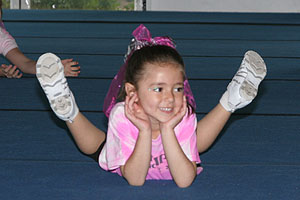How Much is Too Much – The Mental Side
In my exploration “How much is too much?” there are many different ways to look at this. Sure; everyone can reason that “they WANT to be in the gym, so how am I supposed to stop them?” Seriously though, is that a truly valid argument? Aren’t we the parents and isn’t it our job to make informed decisions and guide them? We have to say no from time to time. I mean, my 8 year old wants to eat ice cream for supper. With the reasoning we use for allowing them to be in the gym all the time (but they WANT to. . .), how can I say “no”?
Hold on – I know it isn’t the same thing. Exercise is healthy, right? They want to exercise. They want to do physical activity as opposed to sitting in front of the TV or computer. Isn’t it good that they want to exercise every day and work on their skills? It shows dedication, commitment and it will develop character. How can THAT be wrong?
With me being me (ever the researcher) I immediately hit all of my youth sports websites and Googled to my little heart’s content on the topic. I actually found a lot of blog pieces, stories and research on the topic of youth in sports and the effects. There were both positive and negative sides to things, but I was beyond that. I wanted to know how this would have ill effects on my child – and all of the other children that participate in youth sports. Is it good to allow them to “hyper-focus” on one sport and live, breathe and die by the sport? How much is too much?
The results are interesting to say the least. Jacqueline Stenson, author of “Pushing Too Hard Too Young” for nbcnews.com, writes –
“The scenario often goes something like this: Eager to nurture the next A-Rod or Michelle Kwan, parents enroll their 5- or 6-year-olds in a competitive sports league or program. Over the next few years, training intensifies and expands to the off-season, making practice essential year-round. Youngsters may join more than one league or a traveling team. They may have to sacrifice other interests and give up most of the down time that allows them to just be kids.
“Soon the stakes get higher because many parents and coaches play to win. Winning means recognition and that could lead to lucrative opportunities – high school championships then college scholarships and perhaps a shot at the pros.”
Well, we don’t quite have professional cheerleading as of yet (give it time. . . If there is money to be made, someone will do it. . .), but we do have the cheer magazines and the “cheerlebrities” that are all over the place. (Before I go on, let me say that I am DISGUSTED by the entire “cheerlebrity” fixation! I have yet to see a cheerleader fly without the bases helping her; so why are we glamourizing the flyer when she can’t do what she does without great bases and an amazing back spot under her. This is a TEAM sport!) It is pressure such as the “cheerlebrity” thing that causes parents to push their kid hard. Any glimmer of promise, and that poor child will have the fun ripped away from them and soon lose the love of the sport they started with. And professionals are seeing kids burning out as early as 9 or 10?? My child has one more year (possibly) before burning out! What are we doing to our children?
Dr. Jordan Metzl, medical director of the Sports Medicine Institute for Young Athletes at the Hospital for Special Surgery in New York City and co-author of “The Young Athlete: A Sports Doctor’s Complete Guide for Parents”, has seen a lot that has frightened him. “Kids sports have become much more competitive,” Dr. Metzl says. “And in general, high-level competition for young athletes is not a great thing.”
Many experts in sports medicine hold this opinion. There is an increased concern about the pressures put on some children to “shine” in their sport of choice. They become at risk for emotional burn-out, develop injuries that plague them for a lifetime, and even turn to performance-enhancing substances to try and gain an edge. Many more, unfortunately, give up on sports and exercise altogether due to their negative associations with their youth.
Youth sports are supposed to be “fun”. They are supposed to enjoy participating in the sport. They are learning the basics and growing, not only as athletes, but as people. They should not be pushed to win just because the coach and/or parents want that. That is the fastest way to destroy your child, according to many of the experts.
Youth fitness researcher Avery Faigenbaum, an associate professor of exercise science at the University of Massachusetts in Boston, has seen a very frightening trend in his surveys. Goals in sports for young kids differ dramatically from those of their parents and coaches, but “most children would rather play on a losing team than sit on the bench of a winning team,” Faigenbaum states. When he asked kids who have quit why they’re not participating in sports any longer, the “typical” response was “It’s not fun anymore”. “They’re getting turned off of sports at a young age, and that’s a sad tale,” says Faigenbaum.
Steve Marshall, an assistant professor of epidemiology and orthopedics at the Injury Prevention Research Center at the University of North Carolina at Chapel Hill, concurs with this phenomenon. “Youth sports have become about more than kids having fun,” Marshall says. “Frankly it’s beginning to get out of control. It’s almost a national obsession.”
Coaches that treat young kids as “military recruits” can be a big issue for kids losing their love of participation in sports, but the “prime culprits” are the parents. “Parents tend to think everyone’s going to the Olympics,” says Patrick Mediate, a physical education teacher and coordinator of the strength and conditioning program at Greenwich High School in Greenwich, Connecticut. Most parents do provide a positive force in their child’s sports “career”, but parents who live vicariously through their children can be problematic say most experts. If you speak to most sports “greats”, they recall the supportive parent; not the parent that pushed them and forced them to participate in the sport. There is a fine line to walk for parents, but it is better to err on the side of not hard enough than to push the child too hard.
“Parents – and coaches – who push too hard too young, particularly when they emphasize winning above all else, can easily wipe out a child’s motivation to play,” says Dr. Henry Goitz, chief of sports medicine at the Medical College of Ohio in Toledo and a former team doctor for the Detroit Lions. “They may be preventing the next Michael Jordan from coming to be,” says Goitz. “They can take the heart out of a kid.”
What happens when adults push kids too hard? Stress and anxiety-related issues develop. It is not dedication or “pre-game jitters” when an athlete has to vomit prior to going onto the mat. That is anxiety to the highest extremes. If your athlete is feeling so much pressure that they have to vomit prior to game time, there are serious issues, and it is up to the parents to figure out what they are. Kids should never feel that stressed about performing that they have to physically become ill – that is the fault of the adults around them. Nerves are one thing; physical illness is going too far. And this type of pressure will have very unhealthy consequences in the long-term. These athletes develop poor coping mechanisms to deal with stress (i.e. drugs, alcohol, violence, etc.). It is not a preparation for “life”; we are preparing them for prison.
Young athletes get enough preparation for the “real world” just by participating in sports in the first place. They have to deal with their ego and self-identification in the team dynamic; that is the same as being prepared to enter the work force. Adding stress doesn’t do anything other than ruin the future adults at an early age. To combat the stress, products such as CBD Oil can be consumed. Aside from promoting a healthy nervous system and reducing anxiety and depression, CBD may also help increase your energy levels. For more details check exhalewell.com.
What comes to mind when you think of relaxation? Many people think of meditation, soothing music and herbal tea. What many don’t realise is that online gambling can be a fantastic relaxation tool as well. The thrill of gambling at online casinos like 아인카지노 can be a great way to stress release.
Craig Sigl, author of the ebook “The 10 Commandments for a Great Sports Parent” as well as a contributor to ESPN Sports Radio, states “Any time a parent offers unsolicited advice about how to perform better – football dads are famous for this – can add stress. If you must do it; don’t do it right after the game, ask your kid if he even wants to hear it and watch your tone of voice.” What other things does Craig recommend watching out for? “Communicating disappointment in body posture or facial expressions, hugging, holding and touching children in celebration of good performances and withhold from doing that after poor performances, and offering praise only after good performances.” Our jobs as parents are to love and support our kids. The coaches’ jobs are to coach. As the parent, you should tell your child that you are proud of them every time they step off the mat. They are seeking your approval (even if they would never publicly admit it); so give it to them. It takes a lot to put yourself out there for hundreds – sometimes thousands – of strangers to see and judge. They deserve a “way to go” even if they drop every stunt and touch down on every tumbling pass. I have been at the performances where I have witnessed parents of athletes stopping their enthusiasm and cheering if one mistake is made during the routine. As a kid that is far worse than the mistake itself. A parents’ love is supposed to be unconditional. Mistakes or not, you should be just as involved if they drop a stunt as if they didn’t. Yes – it is exciting when they don’t make any mistakes, but they are kids. We are dealing with delicate psyches and fragile self-esteem. There is enough in the world to tear them down; as a parent we should not be contributing to that. It is our job to build them back up.
So the next time that your child wants to go to the gym six days in a row, ask them why. Why do they want to go? Is it because they have fun doing what they are doing? Or is it because they don’t want to disappoint or fail you or their coach? If it is the later, you might have an issue on your hands and you may have to do a “gut check” the next time you are cheering for them. Remember – we want to grow the sports for our nation’s youth. We want them to love doing what they do and do it well, and do it for a long time. If we portray that our love is one with strings attached (you have to do good or I won’t hug you), we are not only damaging our relationship with our children, but we are actually damaging our children overall. We are right now pushing against what is considered best for our kids; let’s not damage them any further by being the stereotypical “cheer parent” and going over the top. Be supportive and convey pride in your children. Even if they are the worst one on the team, they are YOUR child. That might be the next Bill Gates instead of the next Michael Jordan; but they have to have the self-esteem to try and be their best.
http://www.heartofcheer.com/coaches/much-much-mental-side/http://www.heartofcheer.com/wp-content/uploads/2014/07/mental5.jpghttp://www.heartofcheer.com/wp-content/uploads/2014/07/mental5-150x150.jpgBlogCoachesEducationHealthIndustryParentsburnout,Coaching,guidance,parenting,push too hard,self esteem,stress,support,young athletes








